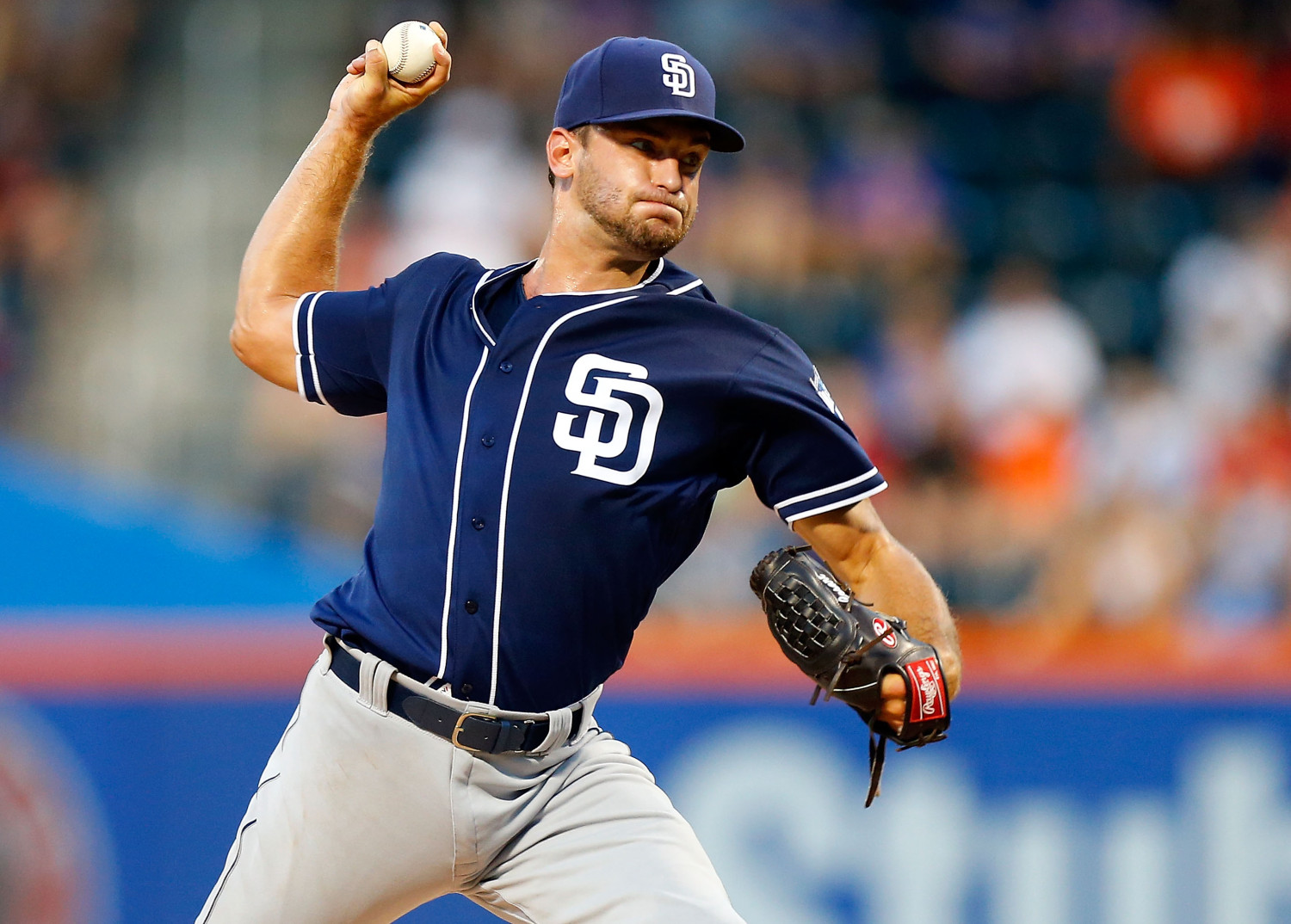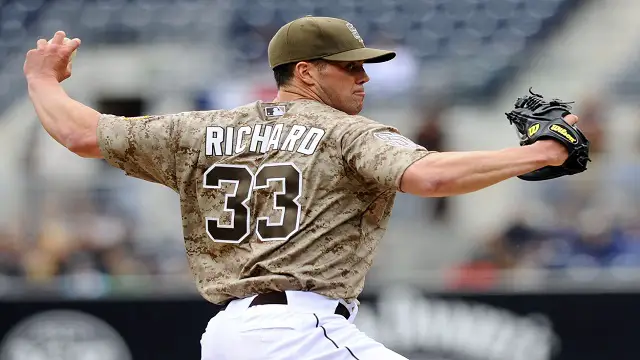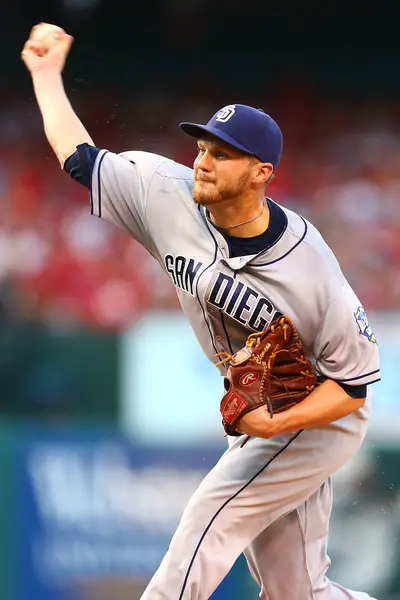Projecting the Padres Muddled Rotation Part 1: Returning Options

(Photo by Jim McIsaac/Getty Images)

Following a successful run in the big leagues with the Padres from 2009-2013, Richard barely touched the majors from 2014-2015, seeing only 42 and 1/3 big league innings with the Cubs in 2015. Following a degree of success out of the bullpen with the Cubs in 2015 and 2016, Richard found himself back with the Padres near the middle of the 2016 season. With the Padres rotation decimated following all the trades mentioned above, Richard found himself a role. And he ran with it.
In total, Richard threw 52 and 1/3 innings as a starter for the Padres in 2016, giving up only 14 earned runs over those innings. His peripheral numbers weren’t great, as he struck out only five batters per nine innings and walked nearly four and had a FIP over 4.00, but it’s hard to argue with all the good innings Richard threw. His 2017 spring training review was clearly forgettable, as the left-hander gave up six earned runs on eight hits in one inning against the Cleveland Indians on Sunday, but Richard is coming off an injury and should still have a pretty solid chance of locking up a rotation spot this spring.
Acquired from the Miami Marlins last July as part of the Andrew Cashner/sort-of Colin Rea trade, Cosart was his usual frustrating self over the last few months of the season. In the second half of the season, the Padres got two completely different versions of Cosart, the one who has shown such great potential, and the one who has been a complete disaster. In the month of August, Cosart threw 25 innings with a sub-3.00 ERA, getting his strikeout rate over seven per nine and walk rate just over four per nine in the process. Those numbers may seem pedestrian, but for Cosart that was certainly a positive development.
Then in September, it all came unraveled for the young right-hander. Cosart only threw 12 and 1/3 innings in September before being shut down prior to his last start. Cosart not only gave up 17 earned runs during those innings, but also walked eleven batters, good for a walk per nine rate over eight. 2016 was certainly an up and down year for Cosart. Going into 2017, it appears Cosart may be better served for a bullpen role, as the right-hander has two solid pitches and has struggles with limiting walks over more extended outings. However, given that he is still just 26 years old, it’s hard to believe the Padres will give up on the idea of him starting just yet. This spring will go a long way in proving if that should be the case or not. A strong first outing this spring was a good first step.

In a lot of ways, it’s actually really hard to tell Jarred Cosart and Paul Clemens apart. Hell, both are even former Marlins! The big difference is that Clemens is a few years older than Cosart and lacks the prospect pedigree that Cosart once had. After signing a minor league deal with the Marlins prior to last season, Clemens found himself claimed off waivers by the Padres at the end of June. Similarly to Cosart, Clemens showed flashes of brilliance and disaster with the Padres last season. In July, Clemens was pretty good, with a 3.46 ERA and nine strikeouts per nine innings. In August he was not so good, with fewer strikeouts and an ERA over 5.00. In September, he was even better, with a 2.45 ERA over his last 25 and 2/3 innings of the season.
Clemens is something of an enigma, as he can actually be pretty good while being pretty bad at the same time. For the Padres 2017 rotation, that may be just enough. Clemens didn’t start this spring off on a good foot, giving up four earned runs over five innings in his first two appearances, but Clemens could still see a spot in the rotation. At the least, Clemens could be a good long relief option for the Padres out of the bullpen.
There’s a common theme here among young Padres pitchers. Volatility and inconsistency. Cesar Vargas fits into that same mold that the likes of Perdomo, Clemens, and Cosart all fit into. To start the season in April, Vargas gave up only one earned run on a solo home run over his first 10 and 1/3 innings. Vargas was also good in his first start of May, but things quickly fell apart for the right-hander, as he gave up six earned runs in his next start. Following two consecutive starts in which he gave up only two earned runs, Vargas gave up seven earned runs before being shut down for the season because of a flexor strain in his right elbow.
Going into 2017, Vargas, like Clemens and Cosart, will have to prove his brilliance can overshadow his consistency. Out of all the Padres returning options, Vargas may have shown the most potential in 2016. However, returning from an injury is never easy, especially given the fact that Vargas will have to fight to earn a rotation spot in 2017. Although Vargas has a shot, he could end up in Triple-A for more seasoning if things don’t go right this spring.
Realistically, the Padres could fill a rotation with some combination of these six guys. However, with the many additions this off-season, and a few other interesting organizational possibilities, the Padres may not need to rely on this group of players as much as they did in 2016. It appears likely that at least two or three of these guys make the rotation, but there’s a real possibility that only one, or even none, could make it. In part two tomorrow, we look at new options that could fill out the Padres’ rotation.
Editorial and Prospect Writer for East Village Times. Twenty-five years young, Patrick has lived in San Diego for his entire life and has been a Padres fan nearly as long. Patrick lives for baseball and is always looking to learn new things about the game he loves through advanced stats.
I just beg to differ, regarding Friedrich…I just think in short time, he gets figured out…and his “lefty-ness” wont keep him from being hit hard..especially in a division full of solid to really great hitters
if he had come along back in the mid-2000s, when Petco was the Grand Canyon, then yea, he’d have a better chance at eating innings. But if you think he’s going to be a guy who routinely gets thru 6-7 innngs, before handing the ball over to the pen…thats not going to happen,sorry. Same thing with Clemens and Cosart
Eating innings doesn’t necessarily meaning getting through seven or eight innings every start. It just means consistently taking the ball every fifth day and giving the team five or six innings, good or not. Last year he averaged 5.6 innings per start. That’s really all the Padres need from him.